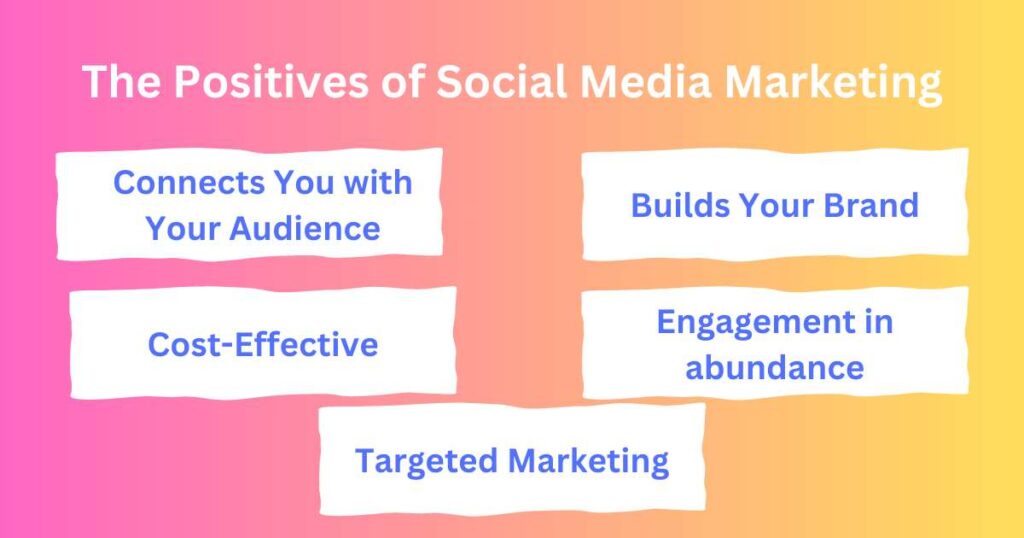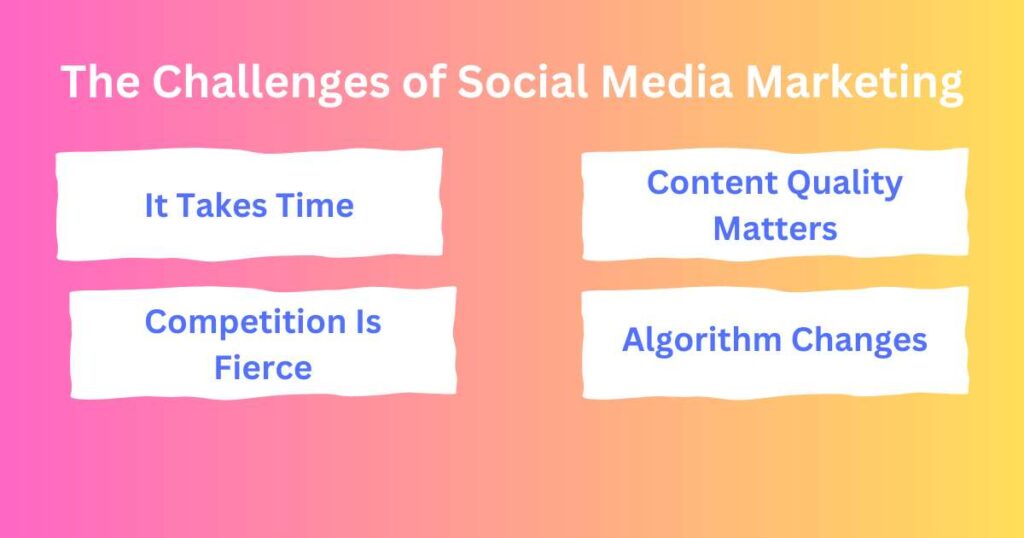Introduction:
In the fast-paced world of online commerce, where the virtual world seamlessly combines closely with the real one, social media marketing stands as a monumental gateway to success for businesses of all sizes. It’s not merely a buzzword but a dynamic strategy that has transformed the way companies engage with their audience, amplify brand presence, and ultimately boost their bottom line.

Table of Contents
What is Social Media Marketing?
At its core, social media marketing is the art and science of leveraging various social media platforms to connect with your target audience, build brand awareness, and achieve specific business objectives. It involves a multifaceted approach that encompasses creating and sharing content, engaging with followers, running paid advertising campaigns, and analyzing data to refine your strategies.
Imagine you own a small coffee shop. Through social media marketing, you can post mouthwatering images of your lattes and pastries on platforms like Instagram and Facebook. You can engage with your customers by responding to comments and messages promptly.
You can run targeted Facebook ads to reach coffee enthusiasts in your local area. All these efforts aim to create a buzz around your café and drive more foot traffic through your door, thereby increasing your revenue.
The Power of Connection
Social media marketing is not just about posting pretty pictures; it’s about fostering meaningful connections. These platforms allow you to interact directly with your audience, which can be immensely beneficial for understanding their preferences and needs. By actively engaging with them by the means of comments or messages, you can build trust and loyalty among your followers.
For instance, if you run an online clothing store, you can use social media to conduct polls and surveys to determine which styles or colors your customers prefer. This data can inform your product offerings, leading to increased sales and customer satisfaction.
Increasing Business through Social Media Marketing

- Enhanced Visibility: By consistently posting high-quality content and optimizing it for search engines, you can increase your brand’s visibility. When potential customers search for products or services you offer, they are more likely to find your business.
- Targeted Advertising: Social media platforms offer highly sophisticated targeting options. You can narrow down your audience based on demographics, interests, behaviors, and more. This means your marketing messages reach the right people at the right time.
- Driving Website Traffic: Social media can be a significant source of website traffic. Share blog posts, product pages, and other valuable content to direct users to your site, where you can convert them into customers.
- Lead Generation: Many social media platforms enable lead generation forms directly within the platform. This makes it easy for interested users to provide their information, allowing you to follow up with tailored marketing messages.
- Sales Funnel Nurturing: Social media is an ideal platform for nurturing potential customers through the sales funnel. You can use different types of content to educate, inform, and engage users at every stage, ultimately leading them to make a purchase.
In essence, social media marketing is a dynamic tool that allows you to not only connect with your audience but also influence their decision-making process. It’s about creating a digital ecosystem where your brand thrives, builds relationships, and, most importantly, grows. When harnessed effectively, it has the potential to elevate your business to unprecedented heights in the digital age.
Chapter2: Social media famous platforms
- Facebook — 2.96 billion MAUs
- YouTube — 2.2 billion MAUs
- WhatsApp — 2 billion MAUs
- Instagram — 2 billion MAUs
- WeChat — 1.26 billion MAUs
- TikTok — 1 billion MAUs
- Telegram — 550 million MAUs
- Snapchat — 557 million MAUs
- X (Formerly Twitter) — 556 million MAUs
*MAUs is Number of monthly active users worldwide.
Chapter 3: Social media marketing tools
Certainly, there are various social media marketing tools available to help streamline and enhance your social media marketing efforts. These tools can assist with tasks such as content scheduling, analytics, audience engagement, and more. Here are some popular social media marketing tools:
- Hootsuite: A widely-used social media management platform that allows you to schedule and publish content on multiple social media platforms, monitor mentions, and analyze performance.
- Buffer: Similar to Hootsuite, Buffer lets you schedule posts, track engagement, and measure the effectiveness of your social media campaigns.
- Sprout Social: A comprehensive social media management tool that provides publishing, engagement, and analytics features, along with valuable insights to inform your strategy.
- Later: Primarily focused on Instagram, Later helps you schedule and plan your visual content, including images and videos.
- Canva: An easy-to-use design tool that allows you to create visually appealing graphics and images for your social media posts.
- BuzzSumo: Helps you find trending content in your niche and identifies key influencers in your industry, enabling you to tailor your content strategy.
- Google Analytics: Provides in-depth insights into your website’s traffic sources, allowing you to measure the impact of your social media efforts on website traffic and conversions.
- Sprinklr: A social media management and customer experience platform suitable for large enterprises, offering features for marketing, advertising, and customer care.
- Agorapulse: A social media management tool with a focus on engagement, including features for monitoring comments, messages, and reviews across platforms.
- Tailwind: Primarily used for Pinterest and Instagram, Tailwind helps with scheduling posts, discovering content, and tracking performance.
- Brandwatch: A social listening and analytics platform that provides insights into brand mentions and sentiment analysis across social media and the web.
- Falcon.io: Offers a suite of social media management tools, including publishing, engagement, and customer service features, suitable for larger businesses.
- Mention: Monitors brand mentions and conversations across the web and social media, allowing you to track your online reputation.
- Socialbakers: A marketing AI platform that provides insights, analytics, and content planning tools for social media marketers.
- AdEspresso: A Facebook and Instagram advertising tool that simplifies the process of creating and optimizing ad campaigns.
These tools can save time, increase efficiency, and improve the effectiveness of your social media marketing efforts. Depending on your specific needs and budget, you can choose the tools that best suit your goals and requirements.
Chapter 4: The Positives of Social Media Marketing

- Connects You with Your Audience:
Social media platforms serve as virtual gathering places for people worldwide. They create a direct and convenient line of communication between your business and your potential customers or fans.
Whether it’s a teenager exploring fashion trends on Instagram or a professional networking on LinkedIn, these platforms offer you a chance to meet your audience where they are, fostering a sense of connection and accessibility.
- Builds Your Brand:
Consistency is key, in order to achieve success, same rule applies when it comes to branding, and social media. Regular, engaging posts not only keep your brand on the radar but also establish and reinforce your brand identity.
Over time, your audience begins to recognize your style, values, and unique voice. This familiarity builds trust and credibility, making your brand the go-to choice in your niche or field in which you are working.
- Cost-Effective:
Social media marketing can be remarkably cost-effective compared to traditional advertising methods like TV or print. While running ads on social platforms may incur some expenses, the ability to reach a vast and specific audience within a predetermined budget is unparalleled. Additionally, organic content and engagement strategies can be implemented at little to no cost, making it accessible to businesses of all sizes.
- Engagement in abundance:
Social media marketing isn’t a one-way megaphone; it’s a dynamic two-way street. You can interact with your audience in real-time through likes, comments, shares, and direct messages. This interaction humanizes your brand, allowing you to respond to questions, address concerns, and express appreciation for your followers.
Engaged followers are more likely to become loyal customers and vocal advocates of your brand.
- Targeted Marketing:
One of the most powerful aspects of social media marketing is its precision in targeting. You can tailor make your content and ads to reach the exact people who are interested in what you’re offering.
Whether you want to target young professionals interested in fitness or retirees passionate about gardening, social media platforms provide an array of demographic, geographic, and interest-based options.
This precision minimizes wastage and maximizes the return on your marketing investment.
Chapter 5: The Challenges of Social Media Marketing

Let’s delve deeper into the challenges of social media marketing:
- It Takes Time:
Building a robust social media presence is akin to cultivating a garden; it doesn’t flourish overnight. Patience is not only a virtue but a necessity when it comes to social media marketing.
Gaining followers, establishing trust, and achieving meaningful engagement with your audience are gradual processes that require consistent effort and time is always an investment that only matures as time passes on.
Rome wasn’t built in a day, and neither a thriving social media presence will.
- Content Quality Matters:
The digital world is filled or saturated with a significant amount of content, but not all content is created equal. To truly resonate with your audience, you must consistently produce high-quality, interesting, and valuable content.
This content should align with your brand’s identity and address your audience’s questions, and aspirations. Maintaining this level of content quality demands creativity, research, and a finger on the pulse of your target audience.
- Competition Is Fierce:
Social media platforms have leveled the playing field, allowing businesses of all sizes to participate. However, this accessibility has resulted in a crowded and highly competitive arena.
In a sea of posts, tweets, and videos, standing out can be a formidable challenge. Crafting content that captures attention and sets your brand apart is an ongoing battle that demands innovation, uniqueness, and a deep understanding of your competitors and playground in which you are playing (social media platforms).
- Algorithm Changes:
Social media platforms are known to be notorious for tweaking their algorithms, and these changes can have a profound impact on how many people see your posts.
What was effective yesterday might not work as well tomorrow. Staying updated on these algorithmic shifts and adjusting your strategy accordingly is very much crucial.
It requires agility and adaptability to ensure your content continues to reach your intended audience.
Chapter 6: Types of Social Media Marketing
Let’s delve into the various types of social media marketing strategies:
- Content Posts:

Content lies at the heart of social media marketing. This strategy involves creating and sharing a wide range of content types, including blog articles, images, videos, info graphics, and more.
These posts are designed to educate, entertain, or inspire your audience, keeping them engaged and informed about your brand, products, or services.
Quality content helps you build trust and create a authority of what you are doing.
- Paid Advertising:
While organic reach is essential, paid advertising is another vital component of social media marketing.
Platforms like Facebook, Instagram, and Twitter offer robust advertising tools that allow you to boost your posts or create targeted ads.
Paid advertising helps you reach a broader and more specific audience, making it a powerful tool for driving traffic, conversions, and sales.
- Influencer Partnerships:
Collaborating with influencers who have a substantial following in your niche can be a game-changer. Influencer marketing involves teaming up with these individuals to promote your products or services to their audience.
Their endorsement carries weight and authenticity, helping you tap into their followers and gain credibility in your industry.
- Customer Support:

Social media platforms have become a popular channel for customer support. Responsiveness and helpfulness on these platforms are crucial for building and maintaining customer trust.
Promptly addressing questions, concerns, and feedback not only satisfies existing customers but also demonstrates your commitment to providing top-notch service.
- Analytics and Insights:
To refine your social media marketing strategy, it’s essential to analyze data and gain insights into what’s working and what needs improvement.
Social media platforms offer a wealth of analytics tools to track engagement metrics, reach, and audience demographics.
Using these insights, you can make data-driven decisions to optimize your content and targeting for better results.
Each of these types of social media marketing strategies serves a unique purpose and can be tailored to your brand’s specific goals and audience. A successful social media marketing campaign often combines several of these approaches to create a well-rounded and effective online presence
Chapter8: How to do social media marketing?
Here is a step-by-step method for doing social media marketing.

- Set Clear Goals and Objectives
- Know Your Target Audience
- Choose the Right Social Media Platforms
- Create Engaging Content
- Develop a Content Calendar
- Engage with Your Audience
- Use Hashtags Strategically
- Implement Paid Advertising
- Monitor and Analyze Performance
- Adjust and Optimize
- Measure ROI
- Stay Informed and Evolve
Chapter 7: The Rules of the Game
- Be Authentic, and Be Yourself:
Authenticity is the steppingstone of successful social media marketing. People are naturally drawn to genuine, relatable individuals and brands.
When you bring your true self into your social media presence, you build trust and credibility. Authenticity humanizes your brand, making it more approachable and likable.
People want to connect with real people, not faceless enterprises. Share your values, stories, and even your occasional imperfections to create a deeper connection with your audience.
- Consistency is Key:
Consistency is absolutely crucial and fundamental for the success of social media marketing. Regular and dependable posting schedules signal to your audience that you’re committed and active.
It keeps your brand top of mind, encourages repeat visits, and reinforces your brand identity. Think of it as a conversation; if you disappear for weeks, the conversation stalls.
Consistent posting keeps the conversation flowing, engaging your audience and ensuring your messages are heard.
- Interact with Your Audience:
Social media is a two-way street, not just a platform for broadcasting messages. Actively engaging with your audience is vital. Respond to comments promptly, answer questions, and participate in discussions. Acknowledge and appreciate your followers’ input. Engaging with your audience shows that you value their thoughts and opinions, and it fosters a sense of community around your brand.
- Listen to Your Audience:
Effective social media marketing isn’t just about broadcasting your message; it’s also about listening attentively to what your audience has to say.
Pay attention to their likes, dislikes, and feedback. Use social media listening tools to monitor mentions of your brand and industry-related conversations.
By understanding your audience’s needs, preferences, and pain points, you can adapt your content and strategy to better serve them. Listening is a powerful tool for staying relevant and customer-centric.
Conclusion:
In conclusion, successful social media marketing relies on authenticity, consistency, interaction, and attentive listening. These principles lay the foundation for building genuine connections with your audience. By staying true to these core values, you can navigate the ever-changing social media landscape effectively and achieve long-term success in reaching your marketing goals.
